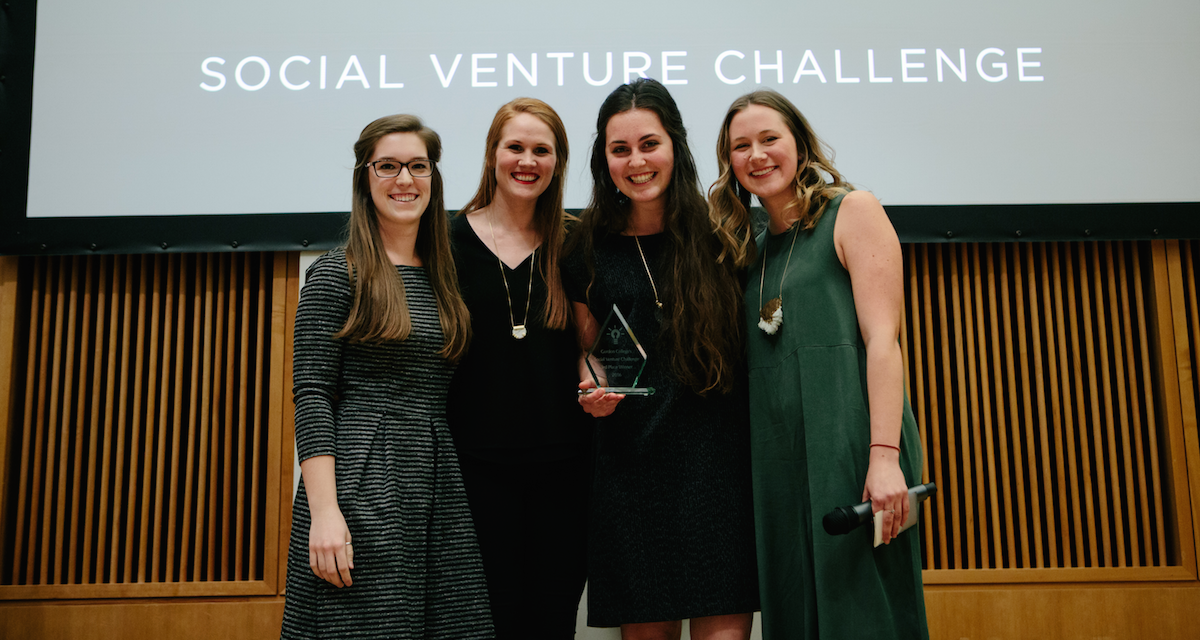Gordon Team Boosts Fair Trade Business Expansion in India
In April, Michelle Buettner ’19, Marin Butterworth ’16 and Chloe Larson ’19 pitched a business plan for Anugra, a fair trade textile enterprise, at Gordon’s Social Venture Challenge. But the Anugra pitch wasn’t just a vague aspiration—it was already happening in India.
The three students collaborated with alumna Brooke Fryer ’15, creative director and coordinator of Anugra’s United States side of business. With fair trade, ethical sourcing in India, Anugra is working to “reach a larger market in the U.S.,” Fryer said. “Socially aware companies are a huge market right now. People want to know who and where their goods are coming from.”
Social awareness is the overarching goal of the Social Venture Challenge (SVC), where Anugra won third place and $2,000. However, Fryer said that the exposure that they gained was even more valuable than the prize money. “It was our first time really learning from executives and more experienced entrepreneurs” who “took time to mentor us,” she said.
Anugra was launched by Influence International, a nonprofit organization that works to provide advocacy and funding in the United States. The enterprise also finds inspiration—and employees—from a sewing instruction program that was started in India by a family of national missionaries and pastors.
That program serves women in low-income areas by providing job skills and a safe community where participants can more fully grasp their abilities and worth. According to Fryer, Influence International now reaches throughout India and Nepal. More than 3,500 women have attended so far, and some are employed by Anugra to make home goods.
The enterprise currently operates out of a church in India, a space that is free, but very tiny, Brooke explains. “We’re looking to hire more women and move to a larger location,” which will help “to provide a safe, welcoming work space for these women—shelter, electricity, water—things they may not have access to where they’re coming from.” Those things are the first steps toward Anugra’s ultimate goal, to “educate, employ and empower women.”
Butterworth’s role included planning the pitch, which Larson presented on the night of the SVC event. “I learned that there are a million different ways to tell a story,” Butterworth said.
She initially planned to start the pitch with personal stories about how Anugra has helped women escape poverty. However, after the SVC workshops, Butterworth changed the script, using photos and tangible examples to provide a broader description of Anugra’s impact: “This pillow I’m holding costs $50 USD, and $50 is the wage that the women get each month—enough for them to live on, and higher than any other wages” that other jobs in the region would provide.
Fryer will travel to India this month, and a key component of the trip will be receiving feedback from Anugra employees: “What are their expectations? How can we continue to improve their conditions?”
“If there’s one thing I’ve learned” working for a startup, she said, it’s “to not plan too far in advance because everything is always changing. Solutions to our problems have to evolve as the venture grows.” She said that she looking forward to expanding the company and getting students involved.
“I have a heart for design, textiles and justice,” she said. Working with Anugra unites all three.
By Morgan Clayton ’19, history
Pictured above (L to R): Buettner, Fryer, Larson and Butterworth
 The Bell
The Bell
